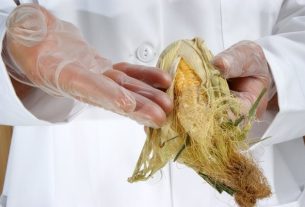Damiana is a medicinal plant, also known as chanana, albino or herb-damiana, which is mainly used as a sexual stimulant, in addition to helping to improve digestion and treat problems related to the menstrual cycle, for example.
This plant has aphrodisiac, antibacterial, astringent, emollient, expectorant, anti-inflammatory, antioxidant, tonic, purgative, antidepressant and stimulant properties.
Damiana’s scientific name is Turnera ulmifolia L. and can be purchased at compounding pharmacies and some natural product stores. It is important that its use is carried out under the guidance of a doctor or herbalist, as studies are still needed to indicate a sufficient dose for the plant to have benefits and no side effects to appear.

What is it for
Damiana has several health benefits, serving some situations, such as:
- Bronchitisas it has an expectorant action, helping to relieve coughs;
- Digestive problemsas it is capable of improving digestion, also helping to prevent constipation;
- Rheumatismas it has anti-inflammatory properties;
- Menstrual crampschanges in the menstrual cycle and vaginal dryness, for example, as it has effects similar to those of female hormones;
- Bladder infections and urinary tract infectionsdue to its antimicrobial property;
- Lack of sexual desireas it is considered an aphrodisiac, helping to treat male impotence;
- Anxiety and depression.
Furthermore, damiana has an anti-hyperglycemic effect, that is, it is capable of preventing blood sugar levels from becoming too high, and can be used as a way to complement diabetes treatment. However, the studies carried out present contradictory results.
Therefore, it is important that damiana continues to be studied so that there is greater scientific evidence about its effects and the ideal daily dose to obtain the benefits.
How to use
Normally, damiana is consumed in the form of tea prepared with the leaves of this plant. However, it also exists as a supplement in capsule or tincture form.
1. Damiana tea
To make the tea, simply place 2 damiana leaves in 200 ml of boiling water and leave for about 10 minutes. Then strain and drink. It is recommended to consume a maximum of 2 glasses per day.
2. Capsules
Damiana capsule doses may vary depending on the concentration of each supplement. However, the recommended amount can vary between 400 to 800 mg, three times a day, taken with a glass of water.
3. Dyeing
The recommended dose of damiana tincture is 2 to 3 mL, that is, 40 to 60 drops, three times a day, diluted in a glass of water. This dose may vary depending on the tincture, and it is recommended to read the product label.
Side effects
The side effects of Damiana are related to excessive consumption of this plant, which can cause liver and kidney problems, in addition to having a laxative and diuretic effect. Using large quantities of this medicinal plant can also cause insomnia, headache, nausea and vomiting, for example.
When it is not indicated
As more studies are still needed to prove the effects of this plant on the body, as well as the toxic dose for the body, it is advised that pregnant or breastfeeding women do not use Damiana.
Bibliography
- PEACE HEALTH. Damian. Disponível em: <https://www.peacehealth.org/medical-topics/id/hn-2077004#hn-2077004-how-it-works>. Acesso em 16 mai 2023
- RAINTREE. Damian. Available at: <http://www.rain-tree.com/damiana.htm#.VD8mlPldVpt>. Accessed on May 3, 2019
- DRUGS.COM. Damian. Available at: <https://www.drugs.com/npp/damiana.html>. Accessed on May 3, 2019
- SIGMA ALDRICH. Damiana (Turnera diffusa). Disponível em: <https://www.sigmaaldrich.com/life-science/nutrition-research/learning-center/plant-profiler/turnera-diffusa.html>. Acesso em 03 mai 2019

Sign up for our newsletter and stay up to date with exclusive news
that can transform your routine!
Warning: Undefined array key "title" in /home/storelat/public_html/wp-content/plugins/link-whisper-premium/templates/frontend/related-posts.php on line 12
Warning: Undefined array key "title_tag" in /home/storelat/public_html/wp-content/plugins/link-whisper-premium/templates/frontend/related-posts.php on line 13



